Web analysts play a crucial role in optimizing the performance of websites by analyzing data and user interactions. They turn insights into actionable strategies to enhance user experience and increase overall site effectiveness.
Skills necessary for a web analyst include proficiency in analytics tools like Google Analytics, understanding of SEO principles, and strong data interpretation abilities. Additionally, effective communication and problem-solving skills are essential to successfully convey findings and implement improvements.
Candidates can write these abilities in their resumes, but you can’t verify them without on-the-job Web Analyst skill tests.
In this post, we will explore 9 essential Web Analyst skills, 10 secondary skills and how to assess them so you can make informed hiring decisions.
Table of contents
9 fundamental Web Analyst skills and traits
The best skills for Web Analysts include Data Analysis, Google Analytics, SQL, A/B Testing, Excel, HTML/CSS, JavaScript, SEO and Reporting Tools.
Let’s dive into the details by examining the 9 essential skills of a Web Analyst.
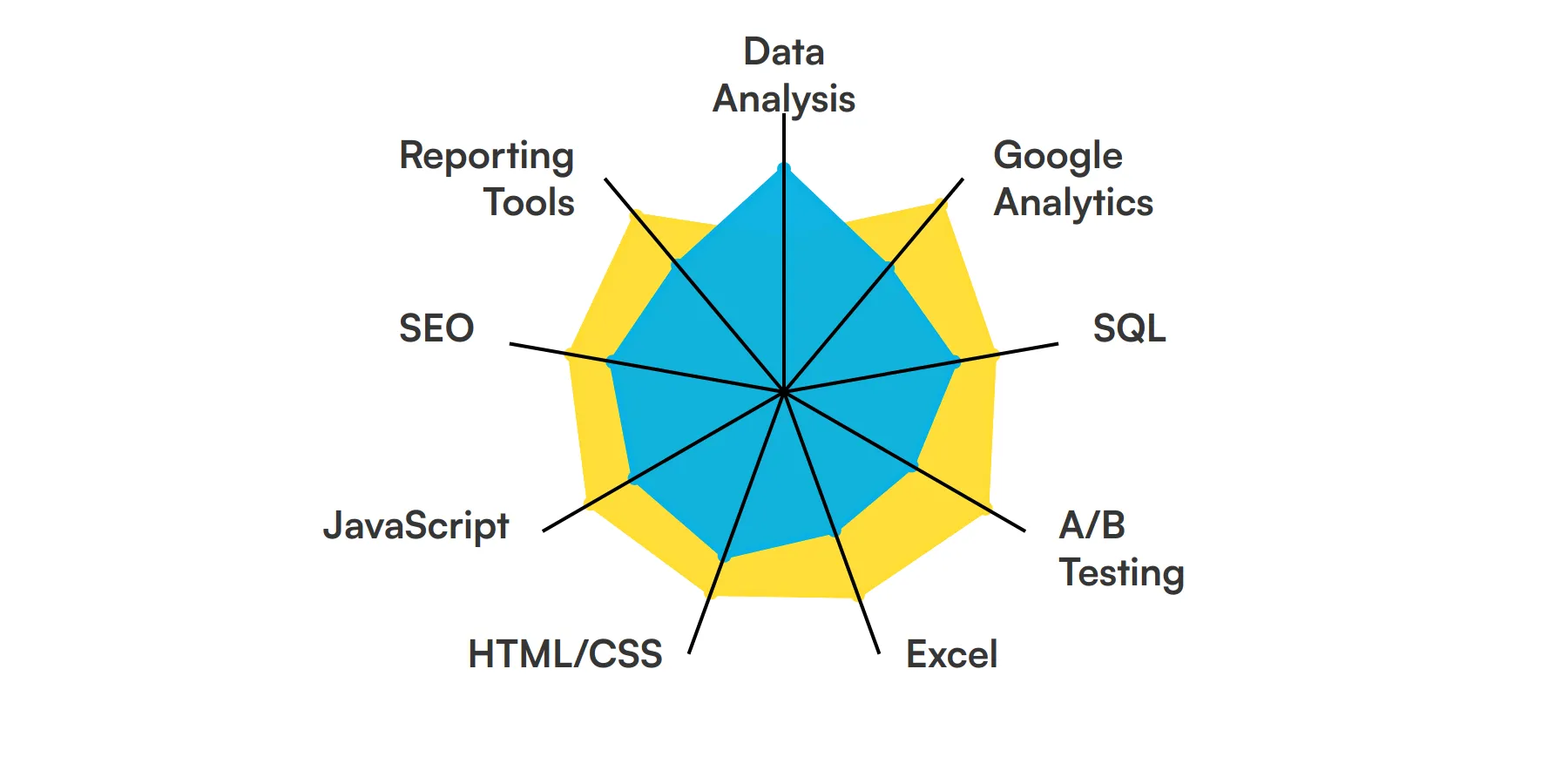
Data Analysis
A web analyst must be adept at data analysis to interpret web metrics and user behavior. This skill helps in identifying trends, patterns, and anomalies in web traffic, which is crucial for making informed decisions.
For more insights, check out our guide to writing a Data Analyst Job Description.
Google Analytics
Proficiency in Google Analytics is a must for any web analyst. This tool provides insights into website performance, user demographics, and conversion rates, enabling analysts to optimize web strategies effectively.
SQL
Knowledge of SQL is essential for querying databases and extracting relevant data. A web analyst uses SQL to manipulate and analyze large datasets, ensuring accurate and comprehensive reporting.
Check out our guide for a comprehensive list of interview questions.
A/B Testing
A/B testing skills allow a web analyst to compare different versions of web pages to determine which performs better. This helps in optimizing user experience and increasing conversion rates.
Excel
Excel is a powerful tool for data manipulation and visualization. A web analyst uses Excel to create detailed reports, pivot tables, and charts that help in presenting data insights clearly.
HTML/CSS
Basic knowledge of HTML and CSS is important for understanding the structure and design of web pages. This helps a web analyst in diagnosing issues and collaborating effectively with web developers.
For more insights, check out our guide to writing a HTML5 Developer Job Description.
JavaScript
Understanding JavaScript is beneficial for a web analyst to implement and troubleshoot tracking codes. This skill ensures accurate data collection and enhances the functionality of web analytics tools.
SEO
SEO knowledge helps a web analyst understand how search engines rank websites. This skill is crucial for analyzing organic traffic and improving a website's visibility on search engines.
Check out our guide for a comprehensive list of interview questions.
Reporting Tools
Familiarity with reporting tools like Tableau or Power BI is important for creating interactive and visually appealing reports. A web analyst uses these tools to present data insights to stakeholders effectively.
10 secondary Web Analyst skills and traits
The best skills for Web Analysts include Python/R, Tag Management, User Experience (UX), Business Acumen, Communication, Project Management, Attention to Detail, Competitive Analysis, Customer Journey Mapping and APIs.
Let’s dive into the details by examining the 10 secondary skills of a Web Analyst.
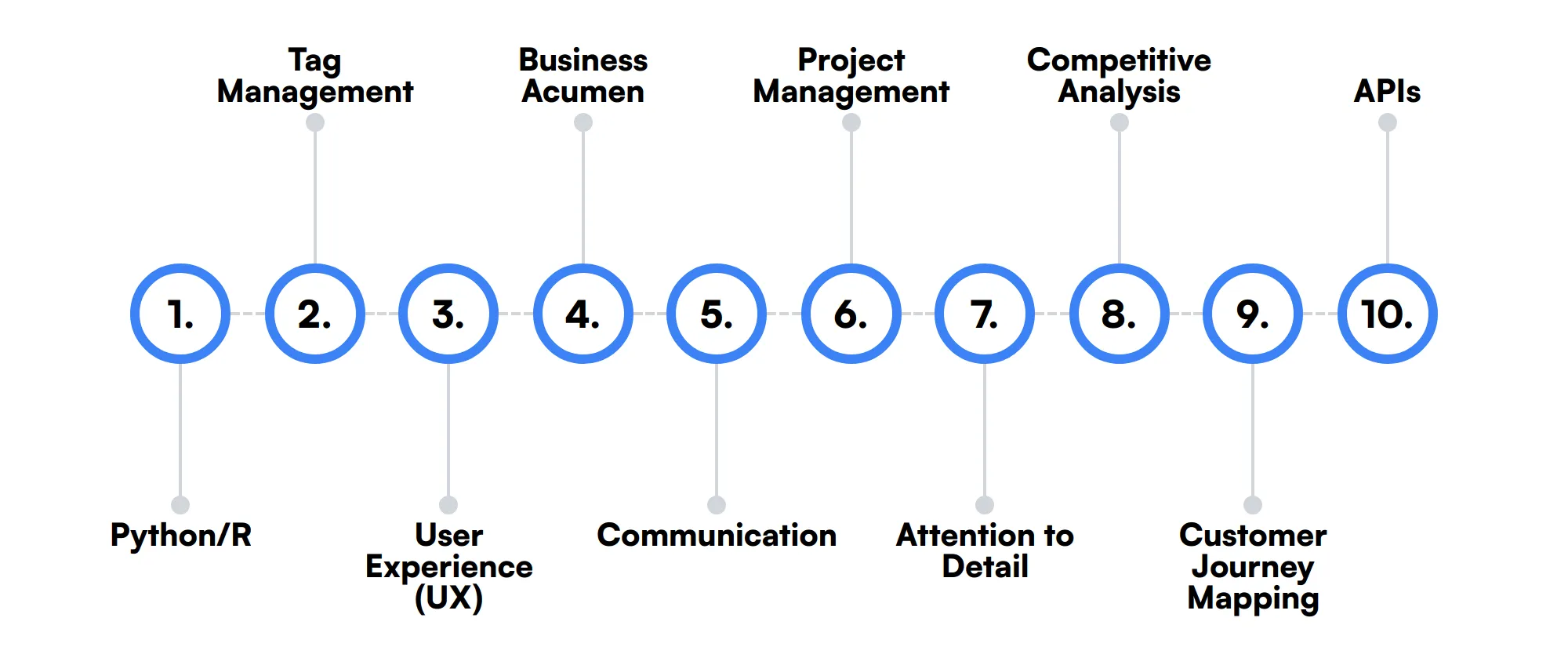
Python/R
Programming skills in Python or R can be useful for advanced data analysis and automation tasks. These languages help in handling large datasets and performing complex statistical analyses.
Tag Management
Knowledge of tag management systems like Google Tag Manager is beneficial for managing and deploying tracking tags without altering the website code. This ensures accurate data collection and flexibility.
User Experience (UX)
Understanding UX principles helps a web analyst in evaluating how users interact with a website. This insight is valuable for making data-driven recommendations to improve user satisfaction and engagement.
Business Acumen
A good grasp of business objectives and KPIs allows a web analyst to align their analysis with the company's goals. This ensures that the insights provided are relevant and actionable.
Communication
Strong communication skills are important for a web analyst to convey complex data insights to non-technical stakeholders. Clear and concise communication ensures that recommendations are understood and implemented.
Project Management
Project management skills help a web analyst in coordinating with different teams and managing multiple tasks efficiently. This ensures timely delivery of analysis and reports.
Attention to Detail
Attention to detail is crucial for a web analyst to ensure data accuracy and reliability. This skill helps in identifying and correcting errors in data collection and analysis.
Competitive Analysis
Understanding competitive analysis allows a web analyst to benchmark website performance against competitors. This helps in identifying areas of improvement and staying ahead in the market.
Customer Journey Mapping
Mapping the customer journey helps a web analyst understand the various touchpoints a user interacts with. This insight is valuable for optimizing the user experience and increasing conversions.
APIs
Knowledge of APIs is useful for integrating different data sources and automating data collection processes. This skill enhances the efficiency and scope of web analytics.
How to assess Web Analyst skills and traits
Assessing the skills and traits of a Web Analyst involves more than just glancing at a resume. It requires a deep dive into their practical abilities to handle data, analyze trends, and drive insights that power strategic decisions. Understanding how to evaluate these skills effectively is key to identifying top talent.
Web Analysts must be proficient in a variety of technical skills such as Google Analytics, SQL, and JavaScript, as well as analytical tools like Excel and A/B Testing. They also need a good grasp of HTML/CSS for web tracking and SEO to optimize content. But how can you measure these skills accurately?
Using skills assessments like those offered by Adaface can streamline the evaluation process. These assessments are designed to test candidates on real-world scenarios that they would face in their day-to-day work. By incorporating tests that cover a wide range of skills from data analysis to reporting tools, you can ensure a comprehensive assessment of each candidate's abilities. Adaface assessments have been shown to reduce screening time by 85%, making your hiring process more efficient and effective.
Let’s look at how to assess Web Analyst skills with these 6 talent assessments.
Data Analysis Test
Our Data Analysis Test assesses a candidate's ability to handle, modify, analyze, and interpret data. It uses scenario-based MCQ questions to screen for experience with analyzing data to find possible outcomes, detect anomalies, extract meaningful insights, project estimates, and visualize data using charts and graphs.
The test covers data modelling, data analysis, business analysis fundamentals, data interpretation, SQL, and popular data tools like Excel. Candidates are evaluated on their ability to perform data operations, investigations, and queries.
Successful candidates demonstrate strong skills in data interpretation, business analysis, and SQL. They can effectively use tools like Excel to visualize data and extract meaningful insights.

Google Analytics Test
Our Google Analytics Test assesses a candidate's ability to use the Google Analytics platform to make data-driven decisions. It tests their ability to set up website tracking, analyze website traffic, understand audience demographics, and drive more targeted traffic to generate leads.
The test covers Google Analytics basics, setting up and customizing reports, tracking website traffic, analyzing user behavior, setting up goals and conversions, and using Google Analytics for marketing campaigns. It also includes advanced analytics techniques and Google Tag Manager integration.
Candidates who perform well show proficiency in creating and customizing reports, tracking and analyzing user behavior, and implementing e-commerce tracking. They can leverage Google Analytics for effective marketing campaigns and advanced analytics.
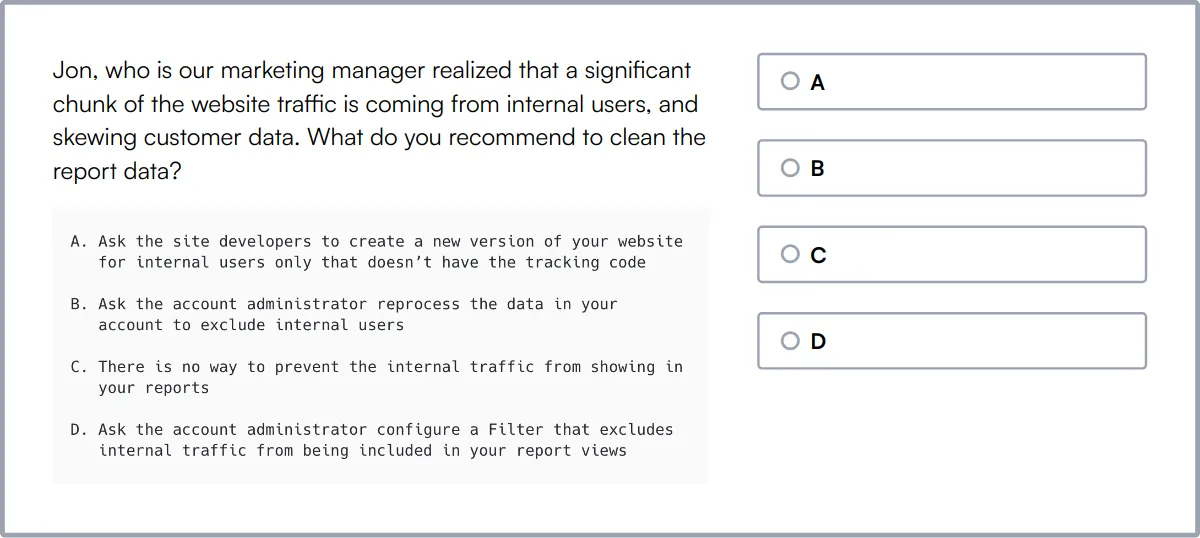
SQL Online Test
Our SQL Online Test evaluates a candidate's ability to design and build relational databases and tables from scratch. It assesses their skills in applying CRUD operations, writing efficient queries and subqueries, and creating indexes for faster SQL queries.
The test covers creating databases and tables, CRUD operations, joins and subqueries, conditional expressions and procedures, views, indexes, string functions, mathematical functions, timestamps, locks and transactions, and scale and security.
High-scoring candidates demonstrate strong skills in database design, query optimization, and data manipulation. They can efficiently handle complex SQL operations and ensure database security and scalability.

A/B Testing Test
Our A/B Testing Test assesses a candidate's knowledge of A/B testing methodologies and their ability to analyze and interpret data to make data-driven decisions. It evaluates their understanding of statistical concepts, experimental design, hypothesis testing, and data analysis techniques.
The test covers designing A/B tests, data analysis, A/B testing integrations, A/B testing web applications, and A/B testing conversions. It includes questions on both A/B testing and data analysis.
Candidates who excel in this test show proficiency in designing and analyzing A/B tests, understanding statistical concepts, and making data-driven decisions to optimize web applications and conversions.
Excel Test
Our Excel Test uses scenario-based MCQ questions to evaluate a candidate's ability to work with large datasets in Excel. It assesses their skills in navigating multiple spreadsheets, using advanced formulas, and creating reports.
The test covers basic and advanced formulas, data types, analyzing data with PivotTables and filters, visualizing data with charts and graphs, working with dates and times, data validation, error handling, inserting and formatting tables, sparklines and data bars, user form controls, data consolidation, and automation with macros.
Successful candidates demonstrate strong skills in data analysis, visualization, and automation using Excel. They can efficiently handle large datasets, create insightful reports, and automate repetitive tasks with macros.
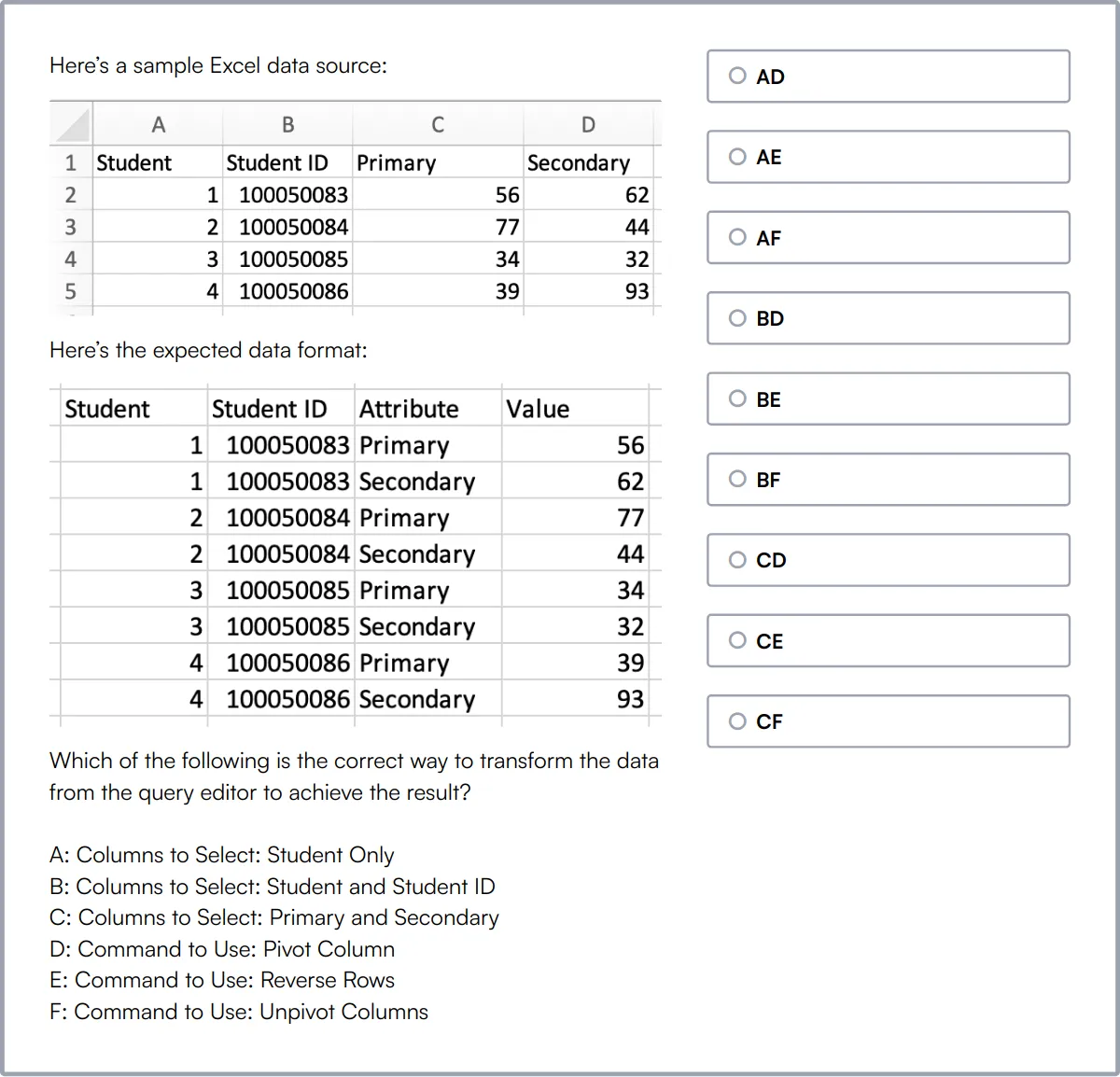
HTML/ CSS Online Test
Our HTML/ CSS Online Test evaluates a candidate's ability to create web pages and style them using CSS. It uses scenario-based MCQ questions to assess knowledge of HTML and critical CSS concepts.
The test covers core HTML tags, handling HTML forms, core CSS concepts like the box model, inheritance, and specificity, styling HTML elements with CSS, Flexbox and Grids for modern layouts, responsive websites using media queries, working with images, integrating custom fonts, and CSS-based animations.
Candidates who perform well demonstrate strong skills in HTML and CSS, including creating responsive layouts, styling web pages, and using modern CSS techniques like Flexbox and Grid.
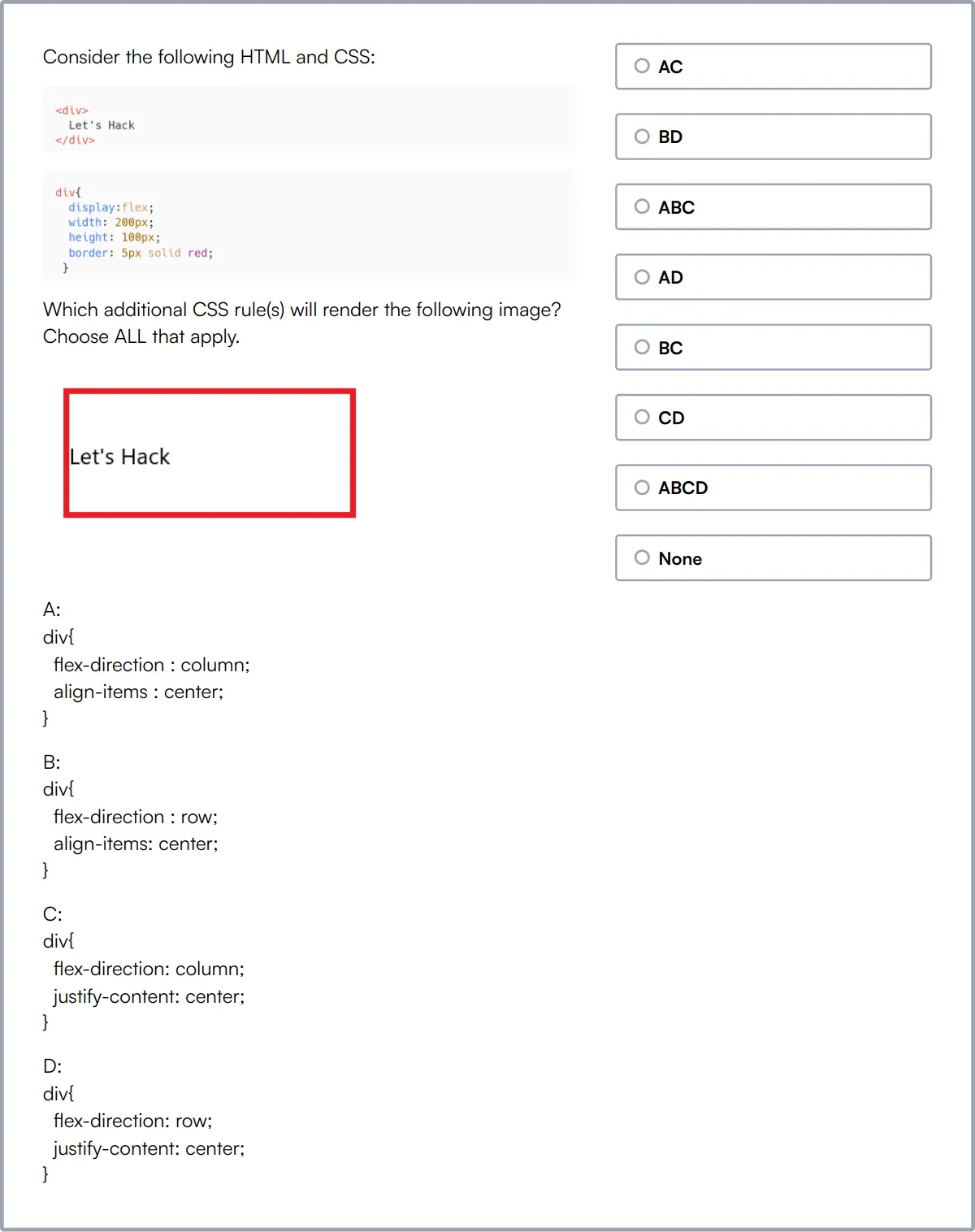
Summary: The 9 key Web Analyst skills and how to test for them
| Web Analyst skill | How to assess them |
|---|---|
| 1. Data Analysis | Evaluate ability to interpret and derive insights from data sets. |
| 2. Google Analytics | Check proficiency in utilizing GA for tracking and reporting website metrics. |
| 3. SQL | Assess capability to write queries and manage relational databases. |
| 4. A/B Testing | Review experience in conducting controlled experiments to improve site metrics. |
| 5. Excel | Test proficiency in data manipulation and analysis using Excel. |
| 6. HTML/CSS | Gauge creation of structured, visually appealing web pages. |
| 7. JavaScript | Assess skills in implementing interactive and dynamic web functionalities. |
| 8. SEO | Evaluate understanding of optimizing websites for search engines. |
| 9. Reporting Tools | Check ability to use tools for data aggregation and visualization. |
Web Testing
Web Analyst skills FAQs
What are the key skills required for a Web Analyst role?
A Web Analyst should be proficient in data analysis, Google Analytics, SQL, and Excel. Knowledge of HTML/CSS, JavaScript, SEO, and various reporting tools is also beneficial. Additionally, skills in Python/R, tag management, and APIs can enhance a candidate's profile.
How can recruiters assess a candidate's proficiency in Google Analytics?
Recruiters can assess proficiency in Google Analytics by asking candidates to describe past projects where they used the tool, discuss the metrics they focused on, and how they interpreted these metrics to make business decisions.
What is the importance of SQL skills for a Web Analyst?
SQL skills enable a Web Analyst to efficiently query databases, extract and manipulate data, and generate insights from large datasets, which are critical for making data-driven decisions.
How does A/B Testing contribute to the role of a Web Analyst?
A/B Testing is crucial for a Web Analyst as it allows them to compare different versions of a web page to determine which one performs better in terms of user engagement and conversion rates.
Why is understanding User Experience (UX) important for a Web Analyst?
Understanding UX helps Web Analysts gauge how users interact with a website, identify pain points, and suggest improvements to enhance the overall user experience and increase user retention.
What role does communication play in a Web Analyst's job?
Effective communication is key for Web Analysts to convey complex data insights in a clear and understandable manner to stakeholders, enabling informed decision-making across departments.
How can project management skills benefit a Web Analyst?
Project management skills help Web Analysts organize, plan, and execute analysis projects with multiple team members, ensuring that tasks are completed on time and within budget.
What is the significance of APIs in the work of a Web Analyst?
APIs are important for Web Analysts as they allow for the integration of different software tools, enabling the automation of data collection and the enhancement of data analysis processes.

40 min skill tests.
No trick questions.
Accurate shortlisting.
We make it easy for you to find the best candidates in your pipeline with a 40 min skills test.
Try for freeRelated posts
Free resources



